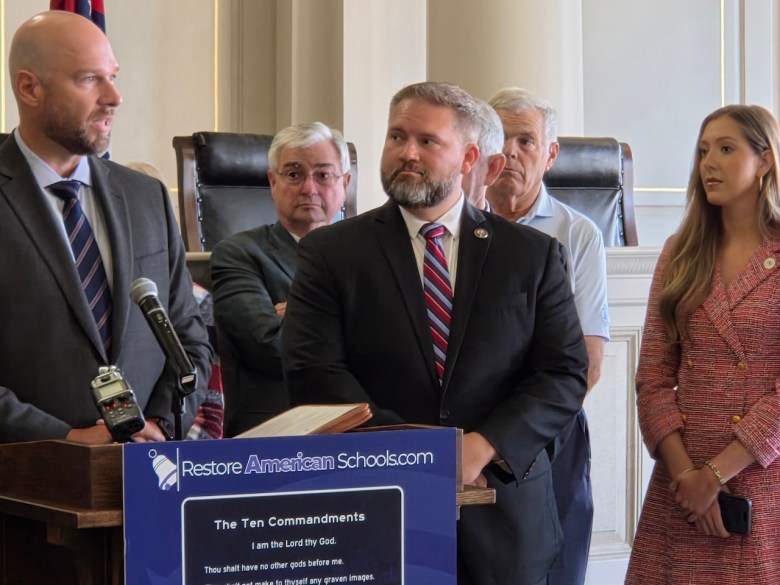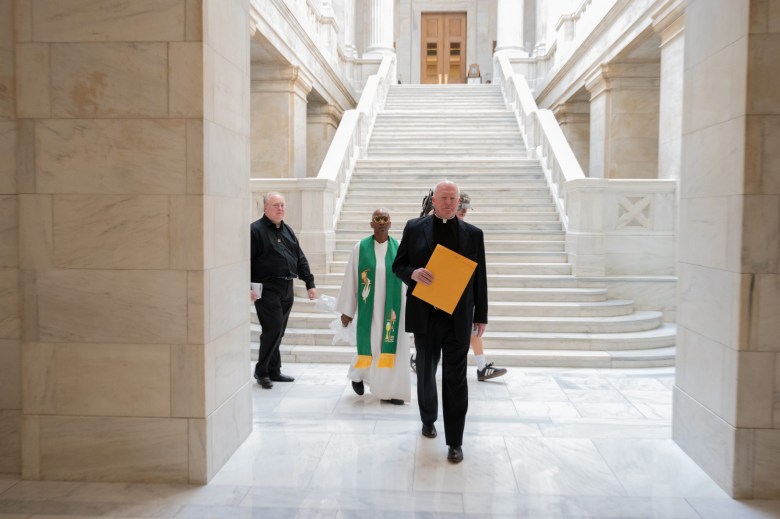On Tuesday, supporters of the Arkansas legislation mandating the public exhibition of the Christian commandments said that the statute is constitutional and grounded in historical custom rather than religion.
On August 4, in a case filed by parents of public pupils in Northwest Arkansas school districts, a federal judge in Fayetteville temporarily halted the implementation of Act 573 of 2025. Only the schools in Fayetteville, Springdale, Bentonville, and Siloam Springs are impacted by the decision.
On August 5, the day the law went into effect, Pine Bluff schools displayed posters of the Decalogue that were provided by local clergy, according to an article by The Pine Bluff Commercial. According to the website of RestoreAmericanSchools, a company that provides schools with Ten Commandments posters, contributors have adopted 288 Arkansas schools.
The law’s primary sponsors, Sen. Jim Dotson (R-Bentonville) and Rep. Alyssa Brown (R-Heber Springs), informed a small group during a press conference Tuesday in the Old Supreme Court room of the state Capitol that Act 573 is still in force in other parts of Arkansas. Along with other speakers, they urged the audience to contribute to a campaign that would display posters of the Ten Commandments in public buildings and schools.
According to Brown, the Ten Commandments are inextricably linked to the history of our country, the establishment of our legal system, and the development of our laws. We support this statute and think a higher court will uphold it.
Additional speakers Tuesday reiterated the point that the Ten Commandments have historically been exhibited in public places and educational institutions, and that the tradition has only been undermined by U.S. Supreme Court decisions since the 1980s.
Texas political activist David Barton, who founded the conservative Christian group Wallbuilders, claimed that a 2019 Supreme Court decision altered the standards for judging whether Christian monuments and symbols were unconstitutional. According to Barton, the high court changed its ruling in that case to presume constitutionality if it could be demonstrated to be traditional and historical.
Speaking about the 2019 high court decision, Jeremy Dys, senior counsel with the religious freedom advocacy group First Liberty Institute, stated that those wishing to remove public displays of religious symbols now have the burden of proving that the monuments and memorials are out of step with American history and our national traditions.
According to Dys, the ruling rendered by U.S. District Judge Timothy Brooks on August 4 was a complete reversal of the Supreme Court’s ruling in the American Legion case.
Arkansas statute is probably [a] part of a coordinated campaign among numerous states to introduce Christian religious ideology into public education classrooms, according to the Brooks opinion. According to these states, the Supreme Court’s decisions during the last ten years regarding religious displays in public areas indicate that the Court may be willing to review its earlier decisions regarding religious displays in public schools.
However, according to Brooks, a state statute that was almost exactly the same as Arkansas law was overturned by the Supreme Court forty-five years ago. He wrote that until the Supreme Court rules otherwise, that precedent is still enforceable.
news source for educationA data study of 28 legislation that are comparable to Arkansas law reveals how their wording, structure, and requirements are fundamentally the same, according to a 74 report published last month. They are identical to the model legislation that Barton presented in dozens of cases.
Patriot Mobile CEO Glenn Story gave Secretary of State Cole Jester a framed replica of a Ten Commandments poster during Tuesday’s news conference.Approximately 20 companies had their logos displayed alongside posters of the Ten Commandments during the press conference, including Patriot Mobile, which bills itself as a Christian conservative wireless carrier.
As a 501c(3) public charity, Arkansas Advocate is a member of States Newsroom, a nonprofit news network backed by grants and a coalition of donors. The editorial independence of Arkansas Advocate is maintained. For inquiries, send an email to [email protected] to reach Editor Sonny Albarado.
Partner Content by Arkansas Advocate
It’s dragon-slaying time!
The Arkansas Times, which relentlessly defends the fundamental rights and liberties in our community, stands as a light of truth in an era when critical voices are being silenced more and more. Our commitment to provide uncompromising journalism has never been more important, especially with Arkansas in the center of a broad culture war that is impacting our libraries, schools, and public conversation. We can’t accomplish our goals of defeating dragons and holding those in positions of authority responsible alone. You can guarantee that independent journalism in Arkansas not only endures but flourishes by making a contribution today. We can join the fight and make a difference together.







